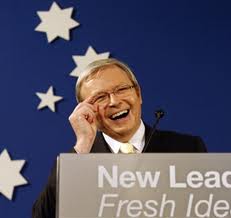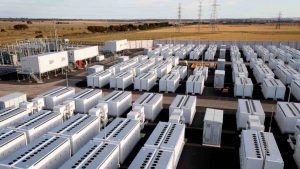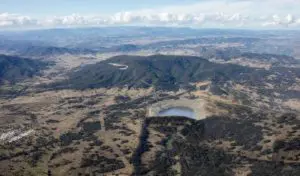Within a few milliseconds of the recycling of Prime Minister Kevin Rudd by the Labor Party late last month, it was pretty clear that one of his first decisions would be to accelerate the move from a fixed carbon price to an emissions trading scheme. We were the first to predict just that – albeit within a few milli-hours.
To have an emissions trading scheme is a good thing. It is regarded by just about every economist as the most cost effective way of finding the projects and the technologies to reduce greenhouse gas emissions, and to address the issue of climate change, which is the point of the whole exercise.
The good news is that Labor’s rebound in the polls means that the carbon price is here to stay, even if Tony Abbott and the Coalition scrape over the line (perhaps with a minority government that relies on Bob Katter and Clive Palmer – just imagine).
But is this decision to accelerate the transition from a tax to a trading scheme a sign of progress? Sadly, no, or at least not yet. There are reasons why the manner of Rudd’s move on the carbon price should make us wince, and should sound some alarm bells. Here are five of them.
Cost to households – After spending the past year arguing that the carbon price was having minimal impact on household budgets – a conclusion supported by economists who put the inflationary effect at between 0.4 to and 0.7 per cent – the Rudd team says the primary reason for switching from a fixed price to traded price a year early is to provide relief to households.
For a piece of spin this is badly thought out, and is typical of the Rudd style. NSW’s Independent Pricing and Regulatory Tribunal (IPART) did say recently that retail prices could fall 6.9 per cent when the carbon price moves to a traded commodity, but this presumes that the wholesale price will fall as predicted (not certain) and can be passed through (also not certain)
Reducing the carbon price means rises in the cost of other components of the electricity price, such as renewable energy certificates. And any falls could be offset by rises in other components of the retail bill, such as transmission and distribution costs, and retailer margins.
This is about politics rather than policy: This a complaint from the Greens’ Christine Milne and she has a strong point, because it has been ever thus with Labor. Rudd got himself elected with some fine speeches about the importance of tackling climate change and gained kudos by signing up to the Kyoto Protocol. But then he used the CPRS to drive a wedge in the Opposition, and managed to get Malcolm Turnbull turfed out by Tony Abbott.
He baulked at a “climate election” he could have won, and dropped the CPRS on the insistence of Julia Gillard and Wayne Swan. Gillard then promised a people’s assembly but no carbon tax in her election campaign, before agreeing to the Clean Energy Future package, including the carbon price, after striking an agreement with the Greens and the country independents to form a minority government. Labor’s positions reek of political opportunism at every turn.
A low price is not necessarily an asset for Australia: There is nothing wrong with a low carbon price as such, but it’s pointless if it is accompanied by a target that is well short of the science. Australia’s decision to link with the ETS effectively exports its price-setting to the state of the EU economy, and the whims of the Poles, who have vetoed efforts to make climate and clean energy targets more ambitious. A low price means Australia outsources the effort to other countries, and that might turn out to be a mistake down the track when the world wakes up to the climate problem and has to reduce emissions everywhere, not just in poor countries. The choice is: low price, outsourced effort and risk of a sharper adjustment later vs higher price, more effort in Australia and lower risk of high-cost adjustment later. Australia is clearly opting for the former.
Ambition: This will be the test of Rudd’s leadership. There is no evidence that Labor is going to aim for a more ambitious emission reduction target. It would argue that it will wait for the Climate Change Authority’s report on this matter. But – apart from the Greens – an increase in ambition for either emissions reduction or renewable energy is absent from the national political debate. Contrast this with the situation in Europe, where many countries are pushing for higher targets in both, the California debate over moving to 50 per cent renewables, and the recent progress in China and the US to prepare their economies for more ambition.
The Opposition: Well, they have been wedged and they know it. Tony Abbott’s thunder has been stolen, and he doesn’t have a credible policy to offer. Abbott cannot argue that Direct Action can deliver cheaper abatement that $6/tonne. Climate Change spokesman Greg Hunt is playing Chicken Little and was warning of a carbon price of more than $350. Now, that might occur if the world hits the action button and seeks dramatic reductions in a short period. The question that needs to be put to Hunt is what that price would be in a Direct Action policy environment and all abatement has to be achieved in Australia in such a scenario. Double, triple ….. ?







